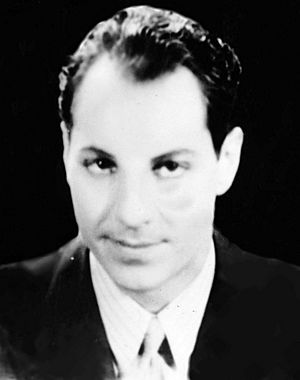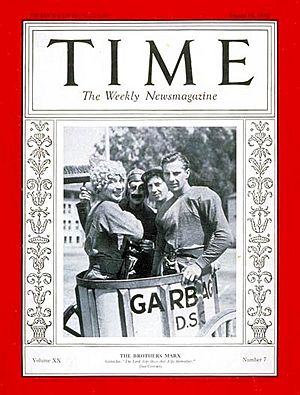Zeppo Marx facts for kids
Quick facts for kids
Zeppo Marx
|
|
|---|---|

Zeppo in 1931
|
|
| Born |
Herbert Manfred Marx
February 25, 1901 |
| Died | November 30, 1979 (aged 78) Eisenhower Medical Center,
Rancho Mirage, California, U.S. |
| Resting place | Ashes scattered in the Pacific Ocean |
| Other names | Herbert Marx |
| Occupation |
|
| Years active | 1918−1978 |
| Known for | Duck Soup, Monkey Business, Marman Clamp |
| Spouse(s) |
Marion Benda
(m. 1927; div. 1954) |
| Children | 2 |
| Parent(s) | Sam "Frenchie" Marx Minnie Schönberg |
| Relatives | Chico Marx (older brother) Harpo Marx (older brother) Groucho Marx (older brother) Gummo Marx (older brother) Al Shean (maternal uncle) |
Herbert Manfred "Zeppo" Marx (February 25, 1901 – November 30, 1979) was an American actor, comedian, and engineer. He was the youngest of the famous five Marx Brothers. Zeppo appeared in their first five movies, from 1929 to 1933. After that, he left acting to become an engineer and a theatrical agent.
Contents
Zeppo Marx's Early Life
Zeppo was born in Manhattan, New York City, on February 25, 1901. His parents were Sam Marx, also known as "Frenchie," and Minnie Marx. Minnie's brother was Al Shean, a famous vaudeville performer.
Zeppo's family was Jewish. His mother came from Germany, and his father was from France. His father worked as a tailor.
How Zeppo Got His Name
There are different ideas about how Zeppo got his stage name. His older brother Groucho Marx once said it came from the Zeppelin airship. Zeppo's ex-wife, Barbara Sinatra, also shared this idea in her book.
His brother Harpo Marx had a different story. He wrote that there was a popular chimpanzee named Mr. Zippo. Harpo said "Herbie" (Zeppo's real name) was called Zippo because he liked to do chin-ups and acrobatics like the chimp. Zeppo didn't like being compared to a chimpanzee, so the name was changed to "Zeppo."
Years later, Zeppo himself said that "Zep" is slang for "baby" in some Italian-American communities. Since he was the youngest Marx Brother, he was called Zeppo.
Zeppo's Career and the Marx Brothers
Joining the Marx Brothers' Act
Zeppo joined the Marx Brothers' stage act in 1918. He took the place of his brother Gummo, who had joined the Army. At that time, Zeppo worked as a mechanic for the Ford Motor Company. He didn't really want to be in show business.
However, his mother, Minnie, wanted the act to stay a group of four. So, she insisted that Zeppo join them. Zeppo stayed with the group and performed in their successful shows. These included vaudeville acts, Broadway plays, and their first five movies.
Zeppo's Role in the Films
In the movies, Zeppo often played the "straight man" or the romantic lead. He was the normal character who helped make his brothers' silly actions seem even funnier. He also appeared alone in a 1925 comedy called A Kiss in the Dark.

Zeppo was very good at imitating his brothers. If one of them was sick, Zeppo could step in and play their part. For example, when Groucho had appendicitis, Zeppo played his role perfectly. Groucho even said Zeppo was "so good" in the movie Animal Crackers.
Some people thought Zeppo's character wasn't as important as his brothers' funny ones. Groucho once joked that they were "twice as funny without Zeppo!" However, many critics now say Zeppo's role was important. He helped the audience understand the crazy situations his brothers created. He was like an "interpreter" for their wild comedy.
Beyond Acting: Engineering and Agent Work
Zeppo had excellent mechanical skills. He was often the one who kept the family car running. Later, he started his own company called Marman Products Co. This company made parts for the war effort during World War II.
His company created a motorcycle called the Marman Twin. They also made Marman clamps. These clamps were used to hold the "Fat Man" atomic bomb inside the B-29 bomber Bockscar. Zeppo also received patents for a special wristwatch that checked heart rate and a heating pad for therapy.
Zeppo also started a large theatrical agency with his brother Gummo. They represented many writers and actors, including their own brothers.
Zeppo's Personal Life
Zeppo introduced his cousin Mary Livingstone to Jack Benny. Mary and Jack later got married.
Zeppo married Marion Benda in 1927. They adopted two children, Timothy and Thomas. They divorced in 1954. In 1959, Zeppo married Barbara Blakeley. Barbara had a son named Bobby, whom Zeppo wanted to adopt. Bobby started using the last name "Marx."
Zeppo owned a house in Rancho Mirage, California. His neighbor was the famous singer Frank Sinatra. Zeppo also belonged to the Hillcrest Country Club, where he spent time with friends like Sinatra, George Burns, and Jack Benny.
Barbara Blakeley later became involved with Frank Sinatra. She and Zeppo divorced in 1973. Barbara later married Frank Sinatra in 1976.
Zeppo's Later Years and Death
Zeppo became ill with cancer in 1978. He spent his last days with Barbara Blakeley's family.
Zeppo was the last of the Marx Brothers to pass away. He died from lung cancer on November 30, 1979, at age 78. He was at the Eisenhower Medical Center in Rancho Mirage. His ashes were scattered into the Pacific Ocean.
In his will, Zeppo left some things and money to his stepson, Bobby Marx, to help him finish law school. Both Frank Sinatra and Barbara Blakeley attended Zeppo's funeral.
Zeppo's Legacy and Impact
Many film experts now believe Zeppo's role in the Marx Brothers' films was very important. He was seen as a "peerlessly cheesy improvement on the traditional straight man." This means he made the serious character funny in his own way.
Early newspaper reviews also recognized his unique style. One review called him "the obliging audience of the family – the feeder who helps his brothers be funny by playing straight himself." Another praised him as "the handsome but dogged straight man with the charisma of an enamel washstand."
Some experts say that the Marx Brothers' movies changed after Zeppo left. The films became more like standard Hollywood comedies. Zeppo's presence helped keep the original wild and unpredictable style of the Marx Brothers.
Writer Charlotte Chandler said Zeppo was "the Marx Brothers' interpreter in the worlds they invaded." He was not just a straight man or just a comedian. He combined both roles. He was the Marx Brother who could seem like a "normal person" in their crazy world.
Filmmaker Rainer Werner Fassbinder even included Zeppo on his list of the ten greatest film actors of all time.
Awards and Honors
In 1974, Jack Lemmon presented Groucho Marx with an honorary Academy Award. This award was also meant to honor Harpo, Chico, and Zeppo. Zeppo was alive and in the audience at the time.
Filmography
Film Appearances
| Year | Title | Role | Notes |
|---|---|---|---|
| 1921 | Humor Risk | The Love Interest | Short, lost film |
| 1925 | A Kiss in the Dark | unknown role | |
| 1929 | The Cocoanuts | Jamison | |
| 1930 | Animal Crackers | Horatio Jamison | |
| 1931 | The House That Shadows Built | Sammy Brown | |
| 1931 | Monkey Business | Zeppo | |
| 1932 | Horse Feathers | Frank Wagstaff | |
| 1933 | Duck Soup | Lt. Bob Roland, Firefly's secretary | His last film role |
Images for kids
See also
 In Spanish: Zeppo Marx para niños
In Spanish: Zeppo Marx para niños
 | Bessie Coleman |
 | Spann Watson |
 | Jill E. Brown |
 | Sherman W. White |



